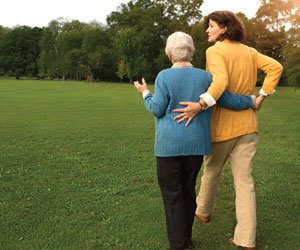AARP Hearing Center

Many AARP members and I have this in common--we've been on both sides of caregiving. We have given and we have received, and considering life's trajectory, it's a trend that will likely continue. Chances are good we will have family members and friends who will depend on us to assist them, provide transportation, and perhaps advocate on their behalf. I'm going out on a limb here, but maybe some of you are like me--occasionally you need some of those very acts of compassion right now.
Caregiving is nonpartisan. It doesn't have borders, it knows all languages. To give it is a responsibility and at times a challenge, but it's also a privilege that centers on kindness, relationship, and being in the moment. To receive it is humbling, requiring a different type of courage and patience all in itself. And it's a fact of life: Pew Research Center reports four in ten adults are currently taking care of a loved one with significant health issues.
There are nearly 470,000 family caregivers in Oregon who are helping an adult relative, spouse, or friend, 67% of whom have taken time off to provide care. Yet only 14% of US workers have paid family and medical leave through their employees. Many use vacation time or take unpaid time off. Eventually, some are forced to leave careers and the job market altogether. According to a report from the National Academies of Sciences, Engineering, and Medicine, life time lost wages and benefits average $303,880 for people age 50 and older who leave the workforce to care for a parent.
At the federal level, AARP supports the RAISE (Recognize, Assist, Include, Support, and Engage) Family Caregivers Act, requiring the development of a national strategy to support family caregivers, and the Credit for Caring Act, providing a tax credit for eligible working family caregivers. Here in Oregon, I was proud to testify on AARP Oregon's behalf last month, advocating for HB 3087, which would create a family and medical leave insurance program. On March 16, AARP Oregon was a sponsor for the Portland Business Journal's Family Caregiving Summit, which addressed topics that not only affect caregivers, but employers as well. Our State Director, Jerry Cohen, pointed out the value of unpaid family care is $5.7 billion annually. He offered caregiving tips, including encouraging care givers to utilize the Care Act which requires hospitals to identify and train those who will provide care following discharge.
The gift of time is immeasurable. In fact, it might be the most valuable component of caregiving. I didn't change his IV bags or check his vitals, but when our son was five years old, he needed my husband or I to be constantly by his side when he spent a frightening week in the hospital. I couldn't transfer my father by myself, or take away his discomfort and confusion, but I know I made a difference in his life just by being there, reading to him, playing music, laughing, observing. It made a positive difference in my life as well. Sometimes the line between caregiving and care receiving is remarkably thin: it's all part of the journey of love. I'm thankful AARP understands and supports it.
For tools and resources, go to aarp.org/caregiving and to find out how AARP is fighting for you, check out aarp.org/SupportCaregivers.
Elaine Friesen-Strang is the AARP Oregon volunteer state president.































































